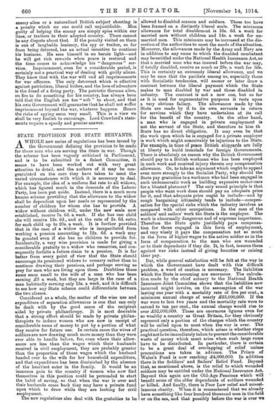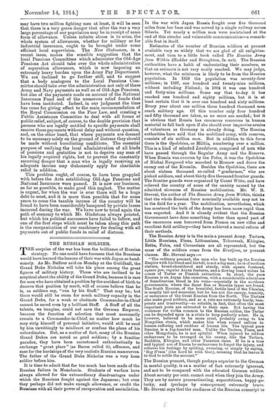STATE PROVISION FOR STATE SERVANTS.
AWHOLE new series of regulations has been issued by the Government definiug the provision to be made for those men who are serving the State in war. Though the scheme has been vaguely criticized in Parliament, and is to be submitted to a Select Committee, it seems to have been worked out with very great attention to detail, and the authors of it may be con- gratulated on the care they have taken to meet the varied circumstances with which it is necessary to deal. For example, the idea of a uniform flat rate to all widows, which has figured much in the demands of the Labour Party, has been put aside. Instead, there is a much more human scheme providing that the allowance to the widow shall be dependent upon her needs as represented by the number of children for whom she has to provide. A widow without children will, under the new scale now established, receive 7s. 6d. a week. If she has one child she will receive 12s. 6d., and at the rate of 2s. 6d. extra for each child up to 20s. a week. It is further provided that in the case of a widow who is incapacitated from working a pension amounting to 12s. 6d. a week may be granted even if she has no children to provide for. Incidentally, a very wise provision is made for giving a considerable gratuity to a widow who remarries, and con- sequently forfeits a future claim to a pension. It is far better from every point of view that the State should encourage its pensioned widows to remarry rather than to continue drawing their pensions, and perhaps serving as prey for men who are living upon them. Doubtless these sums seem small to the wife of a man who has been earning £3 a week, but they are large in the case of a man habitually earning only 15s. a week, and it is difficult to see how any State scheme could differentiate between the two classes.
Considered as a whole, the matter of the wise use and expenditure of separation allowances is one that can only be dealt with by the good sense of the recipient aided by private philanthropy. It is most desirable that a strong effort should be made by private philan- thropists to induce women who are now in receipt of considerable sums of money to put by a portion of what they receive for future use. In certain cases the wives of soldiers are now drawing much more money than they were ever able to handle before, for, even where their allow- ances are less than the wages which their husbands received in civil employment, they are probably greater than the proportion of those wages which the husband handed over to the wife for her household expenditure, and that expenditure has been diminished by the absence of the heartiest eater in the family. It would be an immense gain to the country if women who now find themselves in this position could be persuaded to start the habit of saving, so that when the war is over and their husbands come back they may have a private fund upon which to draw while they are looking for civil employment.
The new regulations also deal with the gratuities to be
allowed to disabled seamen and soldiers. These too have been framed on a. distinctly liberal scale. The minimum allowance for total disablement is 16s. 6d. a week for married men without children and 14s. a week for un- married men. This minimum may be increased at the dis- cretion of the authorities to meet the needs of the situation. Moreover, the allowances made by the Army and Navy are in addition to any sums to which the disabled combatant may be entitled under the National Health Insurance Act, so that a married man who was insured before the war may, if totally disabled, receive as much as 28s. a week for life. This is certainly an extremely liberal allowance, and we may be sure that the pacifists among us, especially those with Socialistic tendencies, will sooner or later draw a contrast between the liberal payment which the State makes to men disabled by war and those disabled in industry. The contrast is not a new one, but so far as it is used for argumentative purposes it rests upon a very obvious fallacy. The allowances made by the State are made by it to its own servants in return for services which they have undertaken at its call for the benefit of the country. On the other hand, a man who is engaged in private employment is not the servant of the State, and therefore to him th State has no direct obligation. It may even be that the work upon which he is engaged for a private employer is work which might conceivably be injurious to the State. For example, iu time of peace British shipyards are fully at liberty to build ironclads for foreign Governments. There is absolutely no reason why the British Government should pay to a British workman who has been employed in such work and received injury therein any compensation allowance. Or, to take an argument which ought to appeal even more strongly to the Socialist Party, why should the State pay gratuities to a workman who had been engaged in such undemocratic work as building expensive motor-cars for a bloated plutocrat ? The only sound principle is that people who want work done should pay an adequate price for it, and that adequate price ought to include—and by rough bargaining ultimately tends to include—compen- sation for the special risks which the industry involves as compared with other occupations. In the case of the soldiers' and sailors' work the State is the employer. The work is abnormally dangerous and of supreme importance. Therefore the State quite justifiably pays compensa- tion for those engaged in this form of employment, and very wisely it pays the compensation not so much in the form of higher wages to the active soldier as in the form of compensation to the men who are wounded or to their dependants if they die. It, in fact, insures them against war risks instead of giving bounties or raising their pay.
But, while general satisfaction will be felt at the way in which the Government have dealt with this difficult problem, a word of caution is necessary. The liabilities which the State is assuming are enormous. The calcula- tion made by the chief actuary to the National Health Insurance Joint Committee shows that the liabilities now incurred might involve, on the assumption of the war lasting one year with a mortality rate of five per cent., a minimum annual charge of nearly £23,000,000. If the war were to last two years and the mortality rate were to extend to ten per cent., the annual charge would rise to over £32,000,000. These are enormous figures even for so wealthy a country as Great Britain, for they obviously represent only a portion of the charges which the country will be called upon to meet when the war is over. The practical question, therefore, which arises is whether steps ought not to be immediately taken to prevent the considerable waste of money which must arise when such large sums have to be distributed. In particular, there is certain to be a great deal of overlapping of relief unless precautions are taken in advance. The Prince of Wales's Fund is now reaching £4,000,000. In addition there is the Soldiers' and Sailors' Relief Fund. Beyond that, as mentioned above, is the relief to which wounded soldiers may be entitled under the National Insurance Act. Beyond this again are the Old-Age Pensions which will benefit some of the older dependants of soldiers wounded or killed. And finally, there is Poor Law relief and miscel- laneous charity. When it is remembered that we already have something like four hundred thousand men in the field or on the sea, and that possibly before the war is over we may have two million fighting men at least, it will be seen that there is a very grave danger that after the war a very large percentage of our population may be in receipt of some form of allowance. Unless infinite abuse is to arise, the whole system of allowances, whether for military or for industrial insurance, ought to be brought under some efficient local supervision. The New Statesman, in a recent issue, makes the sensible suggestion that the local Pensions Committees which administer the Old-Age Pensions Act should take over the whole administration of separation allowances, which is now imposing an extremely heavy burden upon the Army Pay Department. We are inclined to go further still, and to suggest that a body analogous to the Local Pensions Com- mittee should take over the administration not only of these Army and Navy payments as well as of Old-Age Pensions, but also of the payments made on account of the National Insurance Fund and of the numerous relief funds that have been instituted. Indeed, in our judgment the time has come for giving effect to the main recommendation of the Royal Commission on the Poor Law, and creating a Public Assistance Committee to deal with all forms of public relief, subject, of course, to the double provision that persons who are legally entitled to specific payments shall receive those payments without delay and without question, and, on the other hand, that where payments are deemed to be necessary solely on the ground of distress they should be made without humiliating conditions. The essential purpose of unifying the local administration of all kinds of pensions and gratuities is not to deprive any man of his legally acquired rights, but to prevent the constantly recurring danger that a man who is legally receiving an adequate income may dishonestly apply for charitable relief in addition.
This problem ought, of course, to have been grappled with before the Acts establishing Old-Age Pensions and National Insurance were passed. It is now our business, as far as possible, to make good this neglect. The matter is urgent, for when the war is over there will be a huge debt to meet, and it is more than possible that for some years to come the taxable income of the country will be found to have been considerably hampered by private losses incurred during the war. We have now to tread again the path of economy to which Mr. Gladstone always pointed, but which his political successors have failed to follow, and one of the first steps which must be taken along this path is the reorganization of our machinery for dealing with all payments out of public funds in relief of distress.







































 Previous page
Previous page